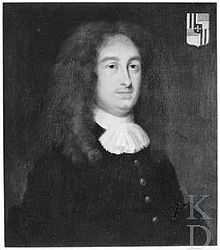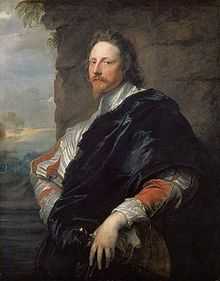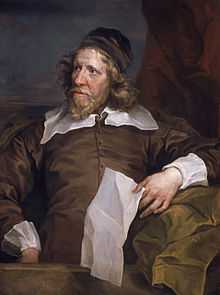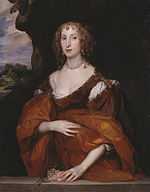Lodewijck Huygens

Lodewijck Huygens (13 March 1631 – 1 July 1699) was the third son of a Dutch public servant Constantijn Huygens (1596–1687), Born in The Hague, Rotterdam, The Netherlands, Constantijn Huygens was also a poet and musician.
Huygens' eldest brother Constantijn Huygens, Jr. (1628–1697) was a Dutch soldier, statesman, and telescope maker. Christiaan Huygens (1629–1695) was a physicist who was also involved himself in important works in optics and sound. Both brothers were associated with the Actuarial Science of insurances and risks.
Lodewijck's ancestors included stadtholders Frederik Hendrik of Orange and his son Prince William II of Orange (1626–1650).
Career in England
At age 20, Huygens carried out diplomatic missions in England. During that period 1651-1652, he met some of his father's friends and colleagues.
Huygens' father had been the Ambassador in England, educated at Leiden University, and he knew English, French, Italian, Dutch, Latin, and Greek. Lodewijck Huygens also had friendships with notable people including Lady Mary Killigrew (née Woodhouse), who was the niece of the famous scientist and philosopher Sir Francis Bacon (1561–1626), Attorney General and Lord Chancellor of England, Baron of Verulam and Viscount of Saint Alban. Her relationship with Huygens' father, Dutch politician and Ambassador Constantine, was questionable as it was supposed that their relationship was of a romantic nature.
Other friendships included the former Bess Throckmorton, (1565 – after 1647), architect Inigo Jones (1573–1652), poet and dramatist Ben Jonson (1572–1637) and Sir Francis Bacon the Attorney general and Lord Chancellor of England.
Huygens was also friendly with exiled Huguenots such as Isaac de Caus (1590–1648), Isaac de Caux and Salomon de Caus (1576–1626) both conversant with Hydraulic Engineering and Automata, Cornelius Drebbel (1572–1633) a glass lenses grinder and instrument maker who was the inventor of the first navigable submarine in 1620, Nicholas Lanier (sometimes Laniere) (1588–1666) an English-born composer, singer, lute player and painter who was the purchaser of paintings for the Crown in Italy.
- Huygens associates in England
-

Nicholas Lanier (1588–1666) musician and purchaser of paintings in Italy for the British Crown, from a painting by Sir Anthony van Dyck.
-

18th century portrait by British painter and engraver William Hogarth of architect Inigo Jones (1573–1652), based on a 17th-century portrait by Flemish Baroque painter Sir Anthony van Dyck (1599–1641).
-

Lady Mary Killigrew (1584–1656), wife of Sir William Killigrew.
-
.jpg)
Sir Francis Bacon, (1561–1626)]].
Royalist views of the Huygens family
Johan de Witt had reached the position of Grand Pensionary of Holland in 1650, aged only 25, through the canvassing and lobbying of his uncle Cornelis de Graeff when William of Orange died leaving his child, the future William III of Orange King of England, in the protection of Huygens' father Constantijn.
Both eminent politicians and properly educated, the De Witt brothers had been students of mathematics and law at Leiden University and shared an interest in insurance and probability and were later eminent politicians with Christiaan and Lodewijck, also well known in Actuarial Science. They were close relatives to the great Dutch regents Cornelis de Graeff and Andries Bicker
Johan and Cornelis De Witt were murdered by Dutch mobs in The Hague on 20 August 1672, leaving a door open for the return to monarchy of the Orange family descents, namely William protected by Constantijn as mentioned above.
Travel to Spain
Huygens' trip to Spain during 1661–1662, was after the Commonwealth republican period, that was led by Oliver Cromwell Lord Protector of England, which meant to defuse the aggressive English politics and the Dutch naval defeats of the time.
Dutch residence

The murder of the De Witt brothers by Dutch mobs in August 1672 changed the foreign outlook of Dutch Politics.
In 1672 the newly appointed Stadtholder William III of Orange, later king William III of England and Ireland and William II of Scotland, appointed Huygens as sheriff of Gorinchem. Huygens' actions as sheriff eventually resulted in considerable strife between local factions, whereby Huygens was faced with a formidable opponent, Jacob van der Ulft.
Accusations of corruption against Huygens eventually resulted in a criminal case before the Provincial Court of Holland and Zeeland, yet Huygens was able to return to his office of sheriff of Gorinchem in 1678. Strife and conflict in the city of Gorinchem continued after Huygens' return, which ultimately resulted in Huygens' fall from grace with his patron William III in 1685. Huygens "voluntarily" gave up his office of sheriff of Gorinchem and was appointed member of the Admiralty of the Meuse instead.[1]
Personal life
He married Jacoba Teding van Berkhout (1645–1711), the daughter of Paulus Teding van Berkhout and Jacomina van der Vorst, on 5 May 1674 when he was aged 43. They had eight children but only the first 3 males survived any significant amount of time: Constantijn born 10 March 1675 at Gorinchem, Gorkum, Louis Diederik born 2 May 1676 at 's-Gravenhage, Delft, Paulus born 24 August 1677 at Gorinchem. The other five children died within 48 hours of birth apart from Maurits born circa 1686, who died aged under 1 year. Susanna Christina born and died circa 1679, Christiaan Hendrik born 19 April 1680 at Gorinchem died after a few days, Christiaan Philips born 29 July 1681 at Gorinchem died a few hours after and Adriaan born 18 August 1682 who died a few hours afterwards.
References
Bibliography
- [Edward Chaney], The Grand Tour and the Great Rebellion (Slatkine, Geneva and C.I.R.V.I. Moncalieri, 1985).
- Herbert H. Rowen, American historian, (1916–1999), John de Witt, Statesman of the True Freedom (Cambridge University Press, 1986, New edition (2002)). 236 pages. ISBN 0-521-52708-2.
- Herbert H. Rowen John de Witt, Grand Pensionary of Holland, 1625–1672. Princeton University Press. (1978), 950 pages. ISBN 0-691-05247-6. Bibliography: pages 895 – 928.
- Quentin Skinner, born November 1940, is now the Barber Beaumont Professor of the Humanities at Queen Mary, University of London. In his Visions of politics : Vol III, Hobbes and Civil Science, Pp. xvii + 386. New York: Cambridge University Press, (2002), he mentions Lodewijck Huygens as being influenced by Thomas Hobbes, (1588–1679).
- H.F. de Wit, Gorcums Heren. Regentenpolitiek 1650–1750 (Gorinchem 1981, 20–31)
See also
- Constantijn Huygens, Jr. – brother
|